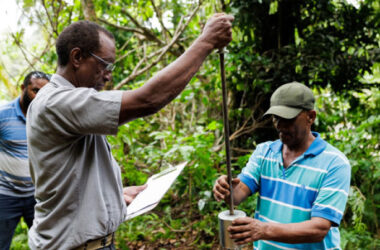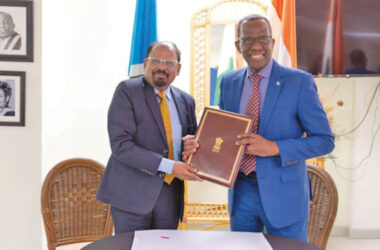Will government make vaccination mandatory for workers in the public sector?
Prime Minister Philip J Pierre at a press conference on Monday, indicated that that just might be the case, if individuals fail to get vaccinated. However, it hasn’t come to this as yet.

According to the Prime Minister, government has two options.
“You can tell people the benefits (and ask them to) look at the pros and cons, (as well as) the evidence, and decide whether to get vaccinated, or you can mandate vaccination and make (it) compulsory,” Pierre said.
If individuals refuse to get vaccinated, even after they have been thoroughly educated, and “we find that there is no other way, we have to consider all the options available to us,” he added.
Although the Ministry of Health continues to tout the vaccines’ efficacy, a large percentage of Saint Lucia’s population is still unvaccinated. This was not the case initially, however, but according to National Immunization Manager, Tecla Jn. Baptiste, a number of factors contributed to the downward trend.

“Very early in the rollout we had a very high uptake at the sites and of course as we go throughout the months we noted a significant decline. Very early in the rollout when AstraZeneca was the only vaccine that was offered at the sites, persons at some point had lots of concerns regarding side effects rare side effects that had been reported especially on the international scene,” Jn. Baptiste explained.
Conspiracy theories about the AstraZeneca vaccine did not help either, but other vaccines have been introduced since then; still some individuals are skeptical.
“By the time we had another wave somewhere around July, August, September, we noted an increase at the sites and once the number of cases and deaths had decreased, we noted that significant decline that we are still experiencing now. We see our trends in vaccination sort of matching the waves,” she said.
But according to her, individuals should not wait to get vaccinated when there is a spike in COVID-19 cases, or when others have died. That is gambling with one’s life, she implied.
“When (there is an) increase (in) cases, the rate of vaccination tends to increase at the sites and once the number of cases decrease the uptake is very low. We understand that sort of reaction, however, we just want to continue emphasizing the importance of vaccines. We shouldn’t react to (the) number of cases but see the bigger picture; the protection that vaccines afford us,” Jn. Baptiste said.
The Ministry of Health has said that the COVID-19 vaccines have proven to be safe and effective in protecting people from developing COVID-19, its severe forms, complications, hospitalizations and death.
Pierre also stated that it is citizens’ responsibility to get vaccinated. The big question is, will individuals support Pierre’s decision to make vaccination mandatory, if he initiates it?
In December of 2021, Dr Hans Kluge, the World Health Organization’s (WHO) Regional Director for Europe said that mandates around vaccination are an absolute last resort and only applicable when all other feasible options to improve vaccination uptake have been exhausted.
According to him, vaccines shouldn’t be made mandatory “if one has not reached out first to the communities.”
He noted that whilst vaccine mandates “have proven effective in some environments to increase vaccine uptake, the effectiveness of vaccine mandates is very context-specific. The effect mandating vaccines could have on public confidence and public trust, as well as vaccination uptake, must be considered.”
“Ultimately, mandates should never contribute to increasing social inequalities in access to health and social services. Any measure that might restrict a right or a movement of a person, such as lockdowns or mandates, needs to be sure that mental health and wellbeing is cared for,” Kluge said.
Vaccine mandates have already been introduced in neighbouring islands including St. Vincent and the Grenadines where all frontline workers are required to be vaccinated.














